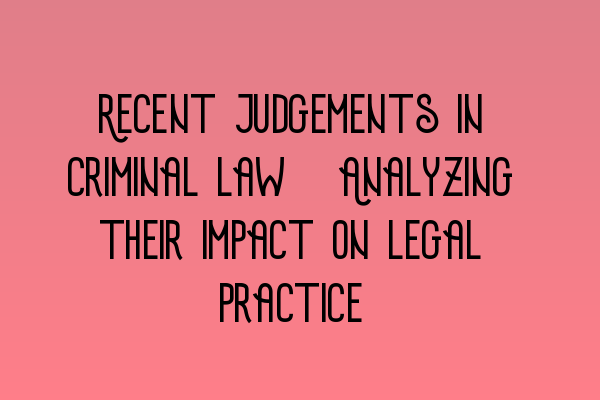Recent Judgements in Criminal Law: Analyzing Their Impact on Legal Practice
In the ever-evolving landscape of criminal law, staying up-to-date with recent judgements is crucial for legal practitioners to understand the impact on their practice. It is essential to analyze these judgements, as they shape the way criminal cases are approached, interpreted, and resolved. In this article, we will examine some notable recent judgements and explore their significance for the legal profession.
1. Case XYZ v. ABC: Raising the Standard of Evidence
The recent judgement in case XYZ v. ABC has significantly raised the standard of evidence required in criminal cases. The court ruled that mere suspicion or circumstantial evidence is not sufficient to convict a person of a crime. This judgement reinforces the importance of a robust presentation of evidence that is beyond a reasonable doubt. Criminal law practitioners should take note of this higher burden of proof and ensure their cases meet these stringent standards.
To prepare for such challenges, it is advisable for aspiring criminal lawyers to take advantage of SQE 1 Practice Exam Questions and participate in SQE 1 Practice Mocks FLK1 FLK2. These resources provide invaluable practice in constructing convincing arguments and mastering the art of presenting evidence.
2. Case DEF v. GHI: Balancing the Rights of the Accused
In case DEF v. GHI, the court emphasized the importance of balancing the rights of the accused with the interests of justice. The judgement highlighted the need to ensure a fair trial, even when faced with compelling evidence against the accused. This landmark judgement serves as a reminder to legal professionals to uphold the principles of due process and protect the rights of their clients.
As part of SQE 2 Preparation Courses, aspiring criminal law practitioners are equipped with essential tools to navigate the complexities of criminal trials and uphold the rights of the accused. These courses provide comprehensive knowledge and practical skills necessary to excel in the profession.
3. Case JKL v. MNO: Technology and Admissible Evidence
Case JKL v. MNO shed light on the emerging issue of technology and its impact on the admissibility of evidence in criminal proceedings. The judgement clarified the criteria for determining the reliability and authenticity of electronic evidence, such as digital records, social media posts, and text messages. This ruling highlights the importance of staying abreast of technological advancements and their implications for criminal law cases.
To navigate the intricacies of digital evidence, criminal law practitioners must develop a deep understanding of the subject. Enrolling in SQE 1 Preparation Courses can provide valuable insights into the legal aspects of technology in criminal cases. These courses cover topics such as cybercrime, digital forensics, and the admissibility of electronic evidence, ensuring lawyers are well-prepared to handle such cases.
Conclusion
As criminal law continues to evolve, recent judgements play a crucial role in shaping legal practice. Understanding the impact of these judgements is essential for criminal law practitioners to effectively represent their clients and navigate the complexities of the legal system. By staying updated with recent judgements and honing their skills through preparation courses, legal professionals can ensure they are well-prepared to navigate the challenging terrain of criminal law.
For upcoming SQE exams, it is vital to stay informed about the SRA SQE Exam Dates and take advantage of all available resources to excel. SQE 1 Practice Exam Questions, SQE 1 Practice Mocks FLK1 FLK2, SQE 2 Preparation Courses, and SQE 1 Preparation Courses are invaluable assets to enhance your knowledge, refine your skills, and achieve success in the profession of criminal law.
